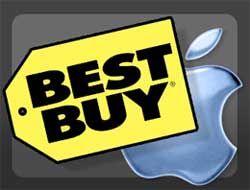Will Best Buy Out-Innovate Apple?

It popped into my head right during the middle of the recent MacBook introduction in Cupertino. A thought that could cause the Apple faithful to burn me at the stake. And here it is: "Hey, Apple is copying Best Buy."
If you haven't heard, Best Buy recently announced its Blue Label program, in which it gathers feedback from customers and uses it to work with its partners to design better products. Kind of like Dell's IdeaStorm initiative, except it's not out in the open for competitors to steal the best ideas. We're talking about a much grander scale here, from a company that has a ton of influence on what the vast majority of consumers wind up purchasing.
About a month ago, Toshiba showed us its new Satellite E105. Many have commented that the E105's shape is reminiscent of the now old-school MacBook Pro. But what I found most interesting are those features that Best Buy worked with Toshiba to integrate. Generally, Best Buy customers said they wanted a few things first and foremost in a new laptop: a thinner and lighter design than the typical mainstream machine, longer battery life, and a backlit keyboard.
And that's exactly what buyers get with the 14-inch E105, which weighs less than 5 pounds (just like the new MacBook), lasts a long time on a charge (5.5 hours claimed versus 4:45 on our MacBook), and sports a backlit keyboard (just like the higher-end $1,599 version of the MacBook). It also boasts some features we wish the MacBook had, like an HDMI port and a 5-in-1 memory card reader. Price for the E105? A reasonable $1,199, $100 less than the starting price for the MacBook.
Granted, the E105's design doesn't wow like the MacBook's—there's a difference between a "brushed metal body" and Apple's striking unibody aluminum chassis—and the E105 is chock-full of buttons while the MacBook is minimalist-chic. The point is that Best Buy brought a number of the MacBook's most compelling virtues to market in a more timely fashion, and over time the big box retailer could overtake Apple's innovation across several product categories. Assuming its partners can execute our best ideas.
Think about it. Let's say that the Blue Label program eventually covers not only notebooks but TVs, set-top boxes, MP3 players, and cell phones. Its certainly plausible that Best Buy could become not just the premier purveyor of consumer electronics but also the ultimate innovator, filtering feedback from customers directly to Apple's biggest competitors and collaborating with them to give Joe Six-Pack exactly what he wants from his next gadget.
The other first Blue Label laptop from HP, the Pavilion dv3500 series, doesn't seem to be as much the result of a deep collaboration with Best Buy as it is HP being handed a wish list of features it agreed to implement. We look forward to reviewing that notebook, too, but I'm more interested to see the next wave of Blue Label products that are built from the ground up in collaboration with the Blue shirts.
Stay in the know with Laptop Mag
Get our in-depth reviews, helpful tips, great deals, and the biggest news stories delivered to your inbox.
Of course, there is a risk here that Best Buy could keep the best ideas for itself for the products it sells under its own Insignia brand. Take Best Buy's latest personal navigators, which went on sale yesterday, the 4.3-inch Insignia NS-CNV20 ($499) and the 3.5-inch Insignia NS-CNV10 ($399). These devices offer baked-in cellular modems for real-time traffic updates and local Google searches. I'm not making any accusations here, but I find it interesting that Dash Navigation has had very little luck getting its innovative GPRS-enabled, Yahoo-searching navigator on Best Buy's shelves.
In the grand scheme of things, it's really in Best Buy's interest to work with and not against the big boys in PCs and consumer electronics. And if anything, I see the Blue Label program accelerating in the coming months; the Insignia brand simply doesn't have enough pull beyond a few markets with very low profit margins.
Should Apple be worried? Not in the short term. The company not only has some of the most innovative minds among its ranks, its customer base is also among the most vocal and passionate. Long-term, however, Best Buy's crowd-sourcing effort could very well give rise to that "One More Thing" from an HP, Sony, Samsung, or Toshiba that even Apple fans will covet.
